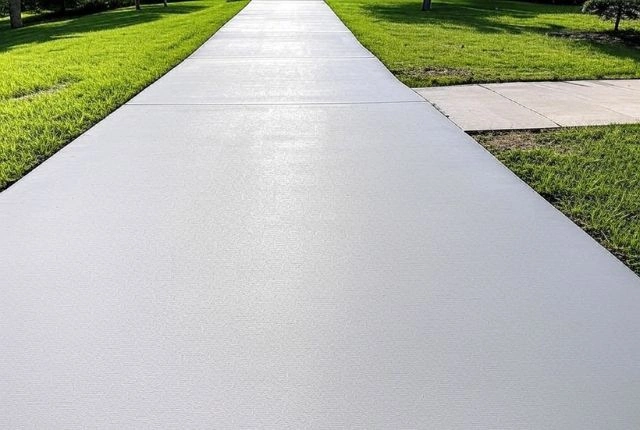A concrete driveway usually lasts 25 to 30 years. Suitable materials, strong installation, and regular care help it last longer. On the other hand, cracks, heavy loads, and poor drainage can make it wear out faster than expected. In Coventry, RI, local weather and traffic also influence the longevity of your driveway.
In this post, we’ll answer the question: how long does a concrete driveway last, and what can you do to help yours last for decades? Keep reading to learn how to get the most life out of your driveway and protect your investment.
What Influences The Longevity of a Cement Driveway
Many things can affect how long your paved driveway will last. Some are part of the building process, while others depend on how you care for them over time. Taking the right approach at each stage gives your concrete driveway a better chance of lasting for years. Let’s take a closer look at what makes a difference.
Concrete Mix Design
A good cement mix has the right balance of water, cement, and other materials. If the mix has too much water, the driveway can crack more easily. A sturdy mix can better withstand weight and weather conditions. Contractors often use specialized mixes for driveways to ensure they are durable enough to handle cars, trucks, and years of wear.
Climate and Weather Conditions
Weather plays a significant role in the lifespan of a cemented driveway. Extreme temperatures, rain, snow, and freezing conditions can cause wear and tear over time. Cement is prone to cracking when subjected to repeated freeze-thaw cycles. If water gets into small cracks and freezes, it expands, worsening the damage.
Paved driveways in Coventry, RI, can suffer significant damage due to the area’s cold winters and snowy conditions. The freeze-thaw cycles, combined with road salt and de-icing chemicals, can accelerate the damage to the surface. The summer heat can also take a toll, causing the driveway to expand and contract.
Subgrade Preparation
The ground beneath the paving is known as the subgrade. If not prepared, the driveway could sink, crack, or deteriorate. A firm subgrade should be flat, compacted, and made with gravel or crushed stone to aid drainage. Builders need to ensure the soil remains stable and can support the weight. A solid base is essential for a durable driveway.
Compressive Strength
Compressive strength is the pressure paving material can handle before it cracks or breaks. The cement mixture used for driveways should be strong enough to support cars and small trucks. Typically, driveways are poured with cast material that has a strength of 3,000 to 4,000 PSI. Selecting the right strength ensures the surface will be more durable and capable of withstanding heavy use and temperature changes.
Reinforcement
Reinforcement helps cement driveways stay strong over time. Steel bars (rebar) or wire mesh are often placed inside the paving mixture to prevent cracks and hold everything together. These materials add support and help the driveway resist pressure from vehicles or ground movement. Without reinforcement, cracks can grow faster and weaken the surface. Using reinforcement gives your driveway extra strength from the inside out.
Proper Curing
Curing is when paving material is allowed to dry slowly and evenly after being poured. If it dries too quickly, it can become weak and crack. Proper curing helps maintain the strength of the surface and extends its lifespan. Driveways are generally cured for at least a week with water or particular covers. Taking the time to cure the cement mixture properly is key to having a durable driveway.
Sealing and Maintenance
Sealing your driveway prevents water, dirt, and salt from penetrating the driveway surface. It acts like a shield on top of the surface. Sealing once a year or as needed protects your driveway from cracks and stains. Regular cleaning and early repair of minor damage can make a significant difference in the care of your driveway. These easy steps help prevent particular problems and can significantly prolong the lifespan of your driveway.
If you’re looking for professional help with sealing, maintenance, or any concrete driveway needs, ConcreteContractors02816 is here to help. We have the expertise to ensure your driveway stays in top shape year-round, saving you money on costly repairs.
How to Extend the Lifespan of Concrete Driveways?

Taking care of your driveway helps it last longer. A few simple steps can protect it from damage and save you from expensive repairs. Here’s how to keep your driveway in top shape.
- Cleaning Regularly: Dirt, leaves, and debris can cause stains or block water drainage. Regular cleaning prevents buildup and keeps your driveway looking great. Use a broom or hose to wash off dirt and leaves.
- Sealing Once a Year: Sealing protects the surface from water, dirt, and chemicals. Apply a sealant once a year to add a protective layer, preventing cracks and stains. It also makes the driveway last longer.
- Repairing Cracks Early: Small cracks can grow bigger if left untreated. Fill cracks early to stop water from getting inside. Quick repairs prevent further damage and keep your driveway looking neat and strong.
- Improving Drainage: Good drainage prevents water from pooling on the surface. Repair any low spots or add drainage channels to ensure water flows away from the driveway properly.
- Minimizing Salt or Other Chemical Usage: Salt and chemicals can damage the driveway surface. Limit the use of your driveway, especially during winter, to help prevent corrosion and cracking. Use alternatives like sand or non-toxic ice melters.
- Avoiding Overload: Heavy vehicles put extra pressure on your driveway. Avoid parking large trucks or heavy machinery for long periods as they can cause cracks or sinking. Stick to normal-sized vehicles to preserve your driveway.
Conclusion
Maintaining and extending the lifespan of a paving driveway requires attention to several important details, from sealing to drainage. Homeowners may struggle to manage all these factors on their own, and keeping track of everything that impacts the driveway’s lifespan can be time-consuming.
Looking for expert help with your concrete driveway? We’re here to provide strong, lasting solutions to ensure your driveway stays in outstanding condition. Reach out today for the professional care your driveway deserves, and enjoy a well-maintained, durable surface.
Frequently Asked Questions
How often should I seal my concrete driveway?
Sealing your driveway once a year is recommended. Regular sealing helps protect it from water damage, stains, and cracking.
How can I prevent my concrete driveway from staining?
Regular cleaning and sealing help prevent stains. Avoid spilling oil or chemicals on the driveway, and use a broom to clear leaves and debris that can trap moisture.
Can I fix cracks in my concrete driveway myself?
Yes, small cracks can be repaired using crack fillers. However, for larger cracks or damages, it’s best to consult a professional for proper repair.
How do I know if my concrete driveway needs replacement?
Your driveway may need replacing if it has large cracks, deep potholes, uneven surfaces, or extensive damage that can’t be properly repaired.
Can concrete driveways be colored?
Yes, cemented driveways can be stained or dyed for a customized look. Various coloring techniques are available, including integral coloring and surface-applied stains.

